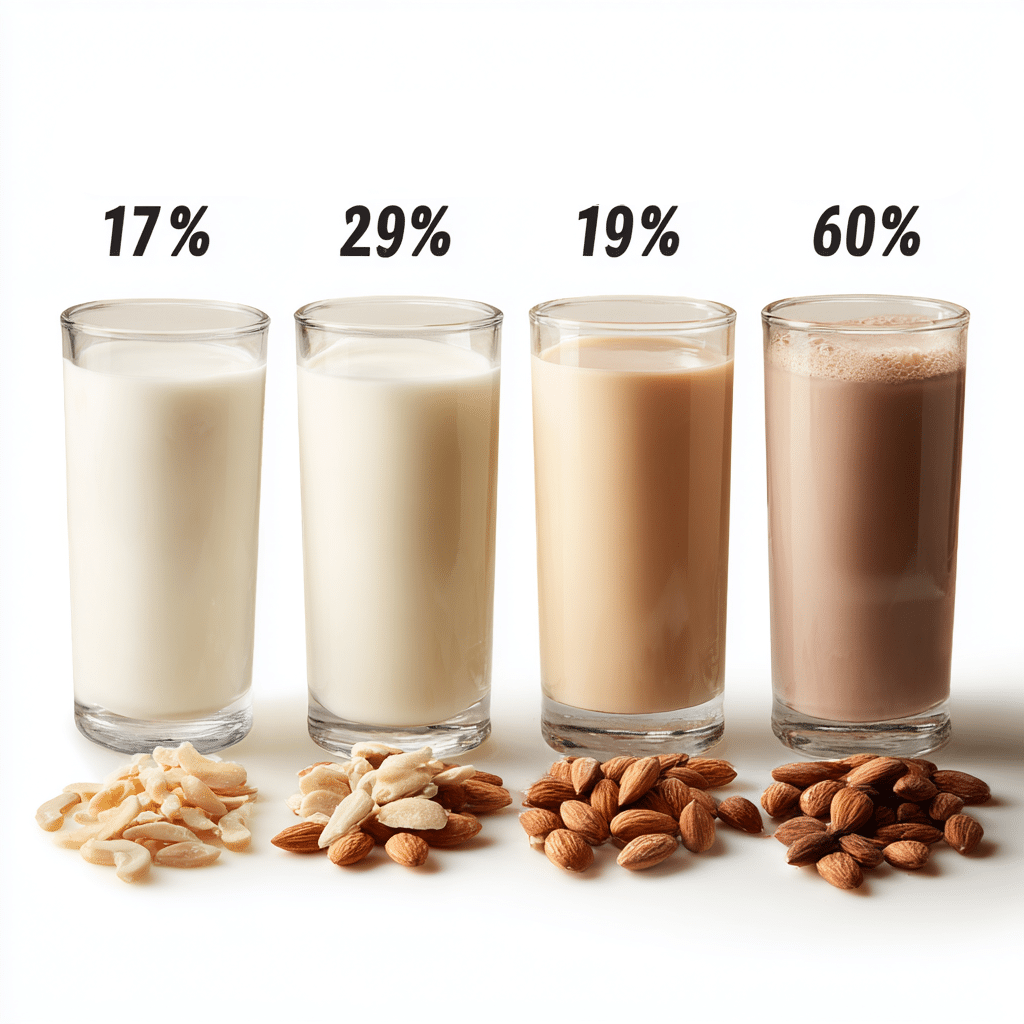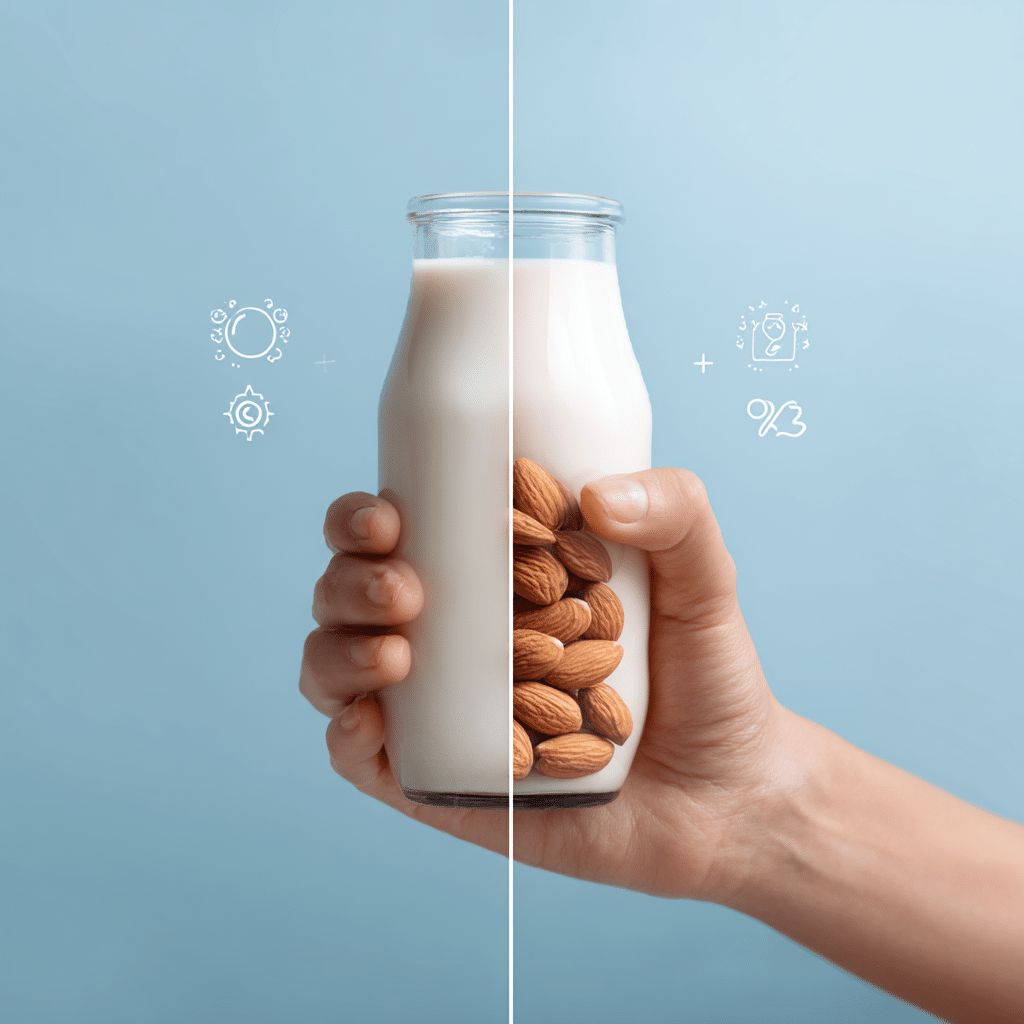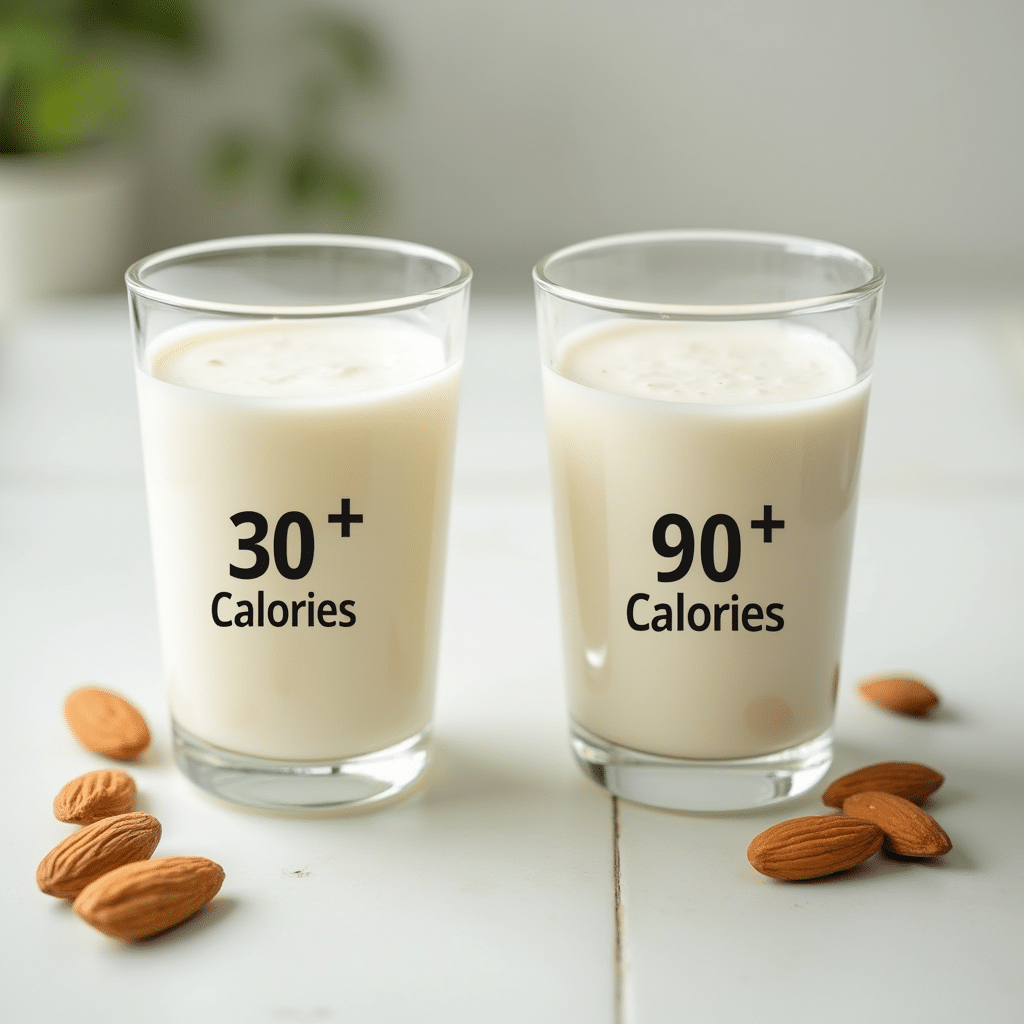If you’re paying attention to your daily food intake, almond milk calories are probably on your radar. Whether it’s for smoothies, cereal, or that morning coffee, almond milk has become a go-to in many kitchens. But just how many calories are in almond milk—and does it really help with weight goals? This guide breaks it all down. From unsweetened to vanilla-flavored versions, you’ll find out how almond milk calories compare across brands and how they fit into a practical, real-life routine.
Table of Contents
Table of Contents
Why Almond Milk Became a Fridge Staple in My Home
The Day I Switched and Noticed the Difference
I started looking into almond milk calories during a season when I just didn’t feel great—heavy meals, low energy, and clothes fitting tighter than I liked. A friend mentioned switching from regular milk to unsweetened almond milk to cut calories and feel lighter. I was skeptical, but I picked up a carton of plain almond milk at the store.
That first pour into my coffee was smooth, mild, and honestly? A nice surprise. And when I saw it only had 30 calories per cup, I was in. I didn’t miss the extra calories, and I certainly didn’t miss the bloating.
Why Almond Milk Calories Matter in Real Life
We’ve all seen flashy claims about what to drink or cut to lose weight. But almond milk calories offer a simple and real solution—especially when you’re swapping it into daily habits like your coffee or breakfast. A cup of dairy milk has 100 to 150 calories, depending on the fat. In comparison, almond milk calories can be as low as 25 to 40 per cup. That adds up, day after day.
It’s one of those small changes that make a quiet difference. Whether you’re trying to lose weight or just feel a bit lighter, understanding almond milk calories helps you make smarter choices without giving up comfort.

Almond Milk Smoothie
Ingredients
Method
- In a high-speed blender or food processor, add almond milk, frozen banana, and almonds. Blend until thick and smooth.
- Add the cinnamon and ice, then blend again until your desired consistency is reached.
- Pour into glasses and enjoy immediately.
Nutrition
Notes
- You can use any unsalted nuts or seeds as a substitute.
- To store: Best enjoyed within 1–2 hours, or store in the fridge up to 2 days. Stir well before drinking.
- To freeze: Freeze in ice cube trays or bags for up to 6 months. Reblend before serving.
Tried this recipe?
Let us know how it was!Types of Almond Milk and Their Calorie Counts
Unsweetened, Sweetened, Vanilla—What’s the Difference?
When people ask about almond milk calories, what they often don’t realize is that not all almond milks are equal. The calorie count can vary widely depending on whether it’s unsweetened, flavored, or sweetened with added sugar.
Here’s a quick look:
| Type | Calories per 1 cup (240ml) |
|---|---|
| Unsweetened Almond Milk | 25–40 |
| Sweetened Almond Milk | 60–90 |
| Vanilla Almond Milk (Sweetened) | 80–100 |
| Chocolate Almond Milk | 100–120 |

As you can see, almond milk calories jump as soon as sugar or flavoring gets involved. That’s why unsweetened is often the go-to for people tracking calories or carbs.
If you’re curious how flavored options like Silk Vanilla Almond Milk compare in both taste and calories, we’ve broken down its ingredients and nutrition in this complete guide to Silk Vanilla Almond Milk.
Reading Labels: The Real Numbers on Almond Milk Calories
If you’re choosing almond milk for its lightness, don’t just rely on the front of the carton. Always check the nutrition label. Some “original” or “vanilla” varieties sound healthy but pack in more almond milk calories than expected. For example, one popular brand’s vanilla almond milk contains 90 calories per cup, while their unsweetened version has just 30.
Another thing to watch? Serving size. Some cartons list 1 cup, others use 100ml as a reference. So when someone asks “how many calories are in 100ml of almond milk?”, the answer is simple math:
If a cup has 30 calories, 100ml has about 12–13 calories.
For a deeper look at almond milk nutrition—including protein content, vitamins, and everyday use—don’t miss our full article on whether almond milk is truly healthy.
Almond Milk and Weight Loss – What to Expect

Is Almond Milk Better for Weight Loss?
One of the most common reasons people search for almond milk calories is weight loss—and it makes sense. A typical cup of whole dairy milk contains about 150 calories, while unsweetened almond milk clocks in at just 30 to 40 calories. That’s a big difference, especially if you’re drinking two to three servings per day.
Swapping dairy milk for almond milk means you’re saving 300–400 calories per week without sacrificing flavor or routine. And since almond milk has little to no sugar (when unsweetened), it helps support steady energy and fewer cravings between meals.
What Happens When You Switch?
When I started tracking almond milk calories and using it in place of dairy, I didn’t notice an instant transformation—but I did feel lighter. Less bloating. Less of that “heavy” full feeling. And when I added it to oatmeal, smoothies, or coffee, I still got the creaminess I wanted, just without the extra calories.
Over time, the savings added up. I wasn’t dieting hard—just making easy swaps. If you’re replacing high-calorie dairy with almond milk consistently, it’s a smart move that supports gradual, sustainable weight loss.
And if your goal isn’t weight loss but just staying light and balanced? Almond milk fits perfectly into a steady, clean eating rhythm without throwing off your numbers.
Frequently Asked Questions
How many calories are in 1 cup of almond milk?
It depends on the type. Unsweetened almond milk typically has 30 to 40 calories per cup. Sweetened or flavored versions can range from 60 to 100 calories.
Is almond milk healthier for weight loss?
Yes, especially when you choose the unsweetened kind. With fewer calories than dairy milk and no added sugar, almond milk supports weight loss by reducing your daily calorie intake without compromising taste.
How many calories are in 100ml of almond milk?
100ml of almond milk has around 12–15 calories for unsweetened versions and up to 40 calories for sweetened kinds.
Is almond milk actually healthier than regular milk?
It can be—depending on your goals. Almond milk is lower in calories and sugar, making it a better choice for weight loss or those avoiding dairy. But it’s also lower in protein, so it’s best to pair it with other nutrient-rich foods if you’re using it as a daily milk replacement.
Wondering if almond milk is actually a better choice overall? We break down the pros, cons, and common myths in our full post on how healthy almond milk really is.

Final Thoughts
If you’re being mindful about your health, almond milk calories are one of those quiet little details that can make a big difference. It’s not just about drinking something lighter—it’s about making easy swaps that work with your life, not against it.
So whether you’re trying to manage your weight, reduce dairy, or just want something gentler on your stomach, almond milk offers a clean, low-calorie option you can feel good about. And remember: always check the label. That’s where the truth is—hidden in plain sight.
Looking for more swaps like this? Check out our Pinterest boards for healthy, real-life meal ideas or follow us on Facebook where we share simple food tips every week.

